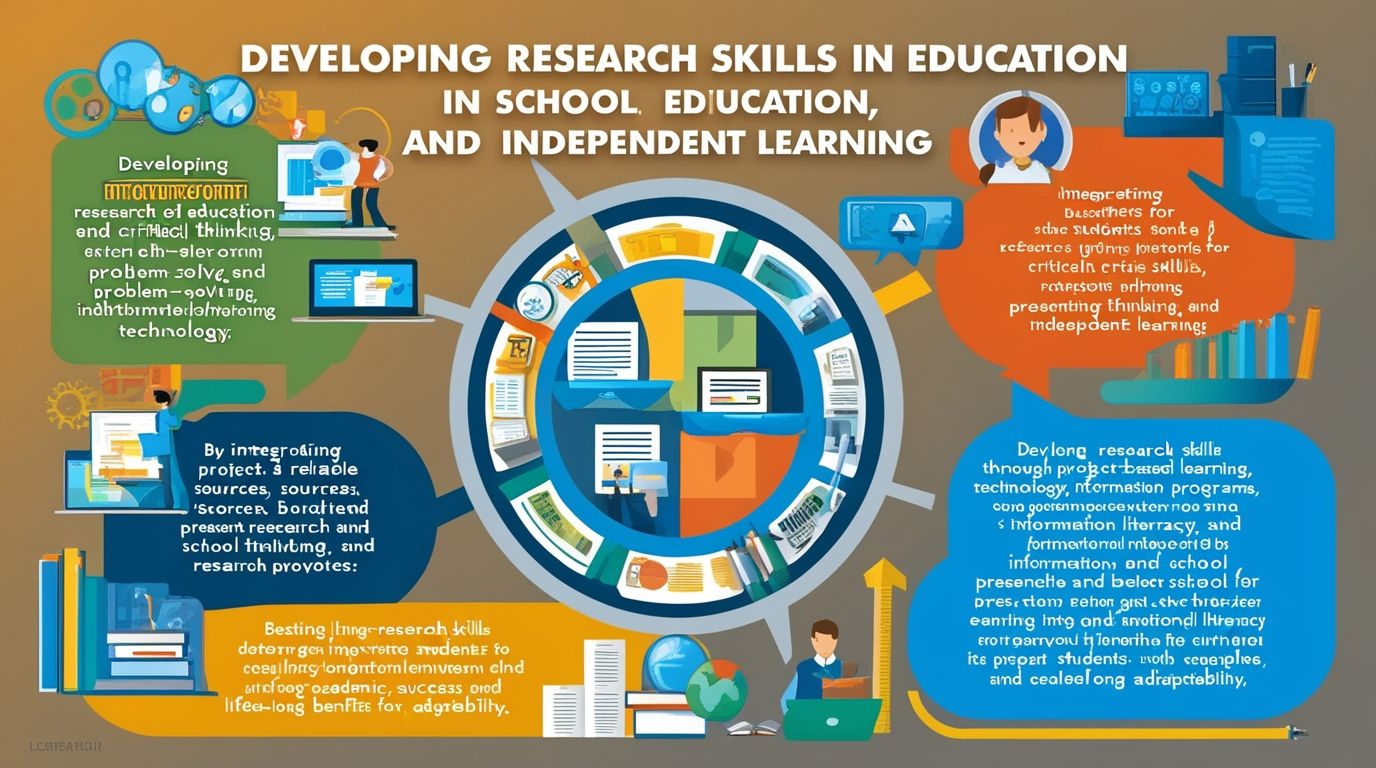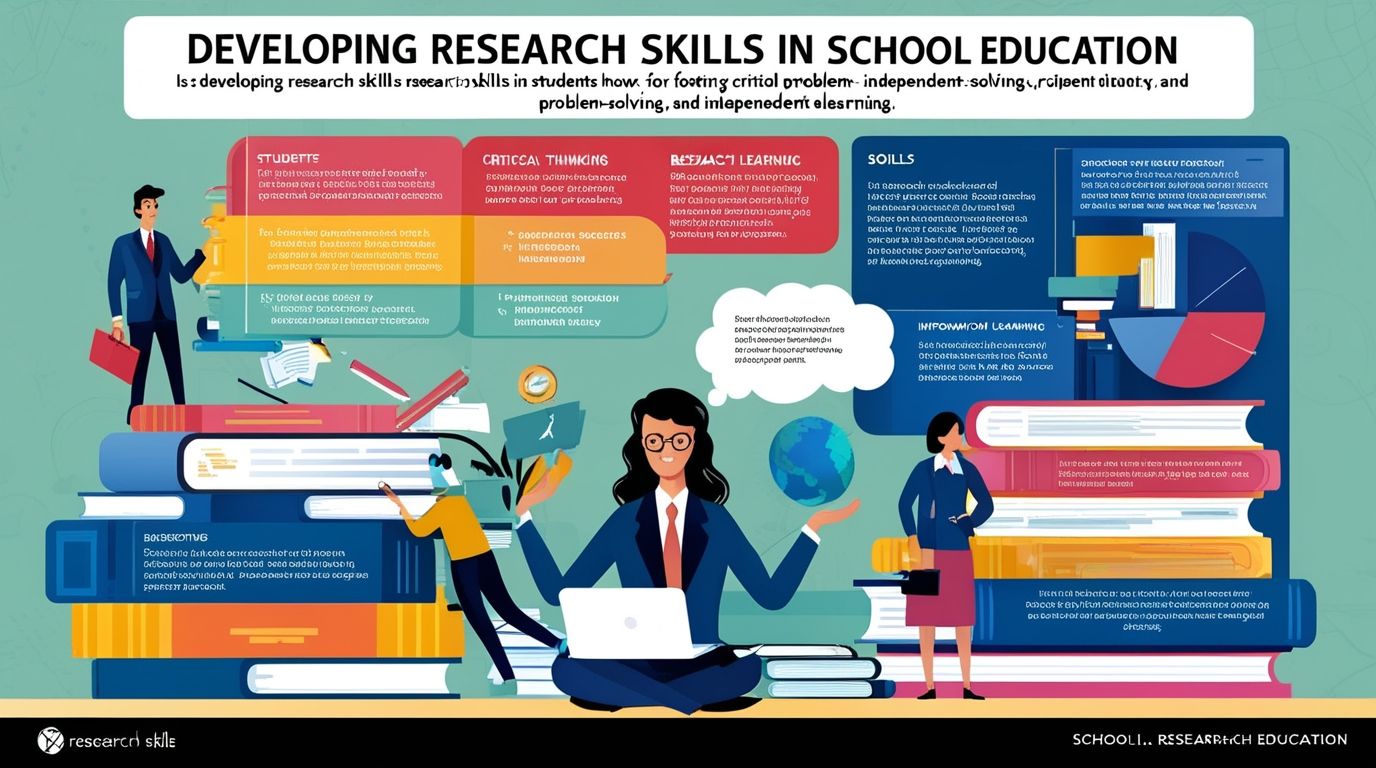Introduction
- Developing Research Skills in School Level Education In today’s rapidly evolving world, the ability to research effectively is a vital skill that extends beyond academic success and into all areas of life. Research skills involve the ability to locate, evaluate, and use information appropriately. During school education, developing these skills is crucial as they foster critical thinking, enhance problem-solving abilities, and promote independent learning. Integrating research skills into the school curriculum prepares students not only for higher education but also equips them with essential tools for lifelong learning and adaptability.
1. The Importance of Research Skills in School Education
- Research skills are foundational to academic success and personal development. They encourage students to engage actively with their learning material rather than passively absorbing information. This active engagement promotes a deeper understanding of content and the development of critical thinking skills. Through research, students learn to:
- Analyze Information: Students are taught to critically assess the credibility and relevance of sources, helping them to discern facts from misinformation, which is increasingly important in the digital age.
- Enhance Problem-Solving Abilities: Research involves identifying problems, seeking relevant data, and developing solutions, which nurtures a systematic approach to problem-solving.
- Develop Independent Learning Skills: Research fosters autonomy as students learn to take charge of their learning processes, setting the stage for independent learning habits.

2. Key Components of Research Skills for School Students
Developing research skills involves several core components that are essential at the school level:
- Source Evaluation: Learning to evaluate the reliability and validity of sources is a critical skill. Students need to understand the difference between primary and secondary sources, peer-reviewed articles, and general web content.
- Note-Taking and Organization: Effective note-taking techniques, such as summarizing, paraphrasing, and organizing information systematically, help students manage large amounts of data.
- Data Collection and Analysis: Basic data collection methods, such as surveys and simple experiments, introduce students to empirical research, enhancing their understanding of the scientific method.
- Synthesis and Presentation: Synthesizing information from multiple sources and presenting it coherently, whether in written or oral form, is an important skill that demonstrates comprehension and communication capabilities.
3. Strategies for Integrating Research Skills into the School Curriculum
- To effectively develop research skills in students, schools need to integrate these skills systematically into the curriculum. Strategies include:
- Project-Based Learning (PBL): Incorporating research projects across various subjects allows students to apply research skills in diverse contexts. PBL encourages collaboration, critical thinking, and real-world problem-solving.
- Information Literacy Programs: Schools should implement information literacy sessions that teach students how to find, evaluate, and use information. These programs can be incorporated into library classes or specific subject areas.
- Use of Technology: Leveraging digital tools, such as online databases, educational apps, and collaborative platforms like Google Workspace, can enhance students’ research capabilities and make the process more engaging.
- Cross-Disciplinary Projects: Encouraging projects that integrate multiple subjects can help students see the interconnectedness of knowledge and how research skills are applicable across different fields.
4. Challenges in Teaching Research Skills and Solutions
- While the importance of research skills is clear, educators face several challenges in integrating these skills into the school curriculum:
- Limited Resources: Schools, particularly in underfunded areas, may lack access to updated resources like books, journals, and online databases. To overcome this, schools can utilize free or low-cost online resources, collaborate with local libraries, and integrate digital literacy skills to maximize the available tools.
- Time Constraints: The already packed school curriculum often leaves little room for extensive research activities. Teachers can address this by embedding short research tasks within existing assignments or subjects rather than treating research as a separate activity.
- Diverse Skill Levels: Students often have varying levels of proficiency in research skills, which can make uniform instruction challenging. Differentiated instruction, where tasks are tailored to individual skill levels, along with peer mentoring programs, can help address this disparity.
- Resistance to Change: There may be resistance from both students and teachers in adopting new research methodologies or technologies. Providing professional development opportunities for teachers and gradually integrating research skills into the curriculum can help ease this transition.
5. Long-Term Benefits of Research Skills
- The development of research skills at the school level offers numerous long-term benefits, extending well beyond academic performance:
- Preparation for Higher Education: Research skills are a cornerstone of higher education, where students are expected to engage in independent study and research. Early exposure to these skills can make the transition to college or university smoother and less daunting.
- Career Readiness: In today’s job market, the ability to conduct research, analyze data, and draw informed conclusions is highly valued across many professions, from business to healthcare to the arts.
- Lifelong Learning and Adaptability: Research skills cultivate a mindset of inquiry and continuous learning, which is essential for adapting to new challenges and opportunities throughout life. In a world where information is constantly evolving, the ability to learn independently is an invaluable skill.
Conclusion
- Developing research skills during school education is not just about preparing students for academic success; it is about equipping them with critical life skills. These skills foster a deeper engagement with learning, enhance problem-solving abilities, and promote independence. By integrating research skills into the school curriculum through project-based learning, information literacy programs, and the use of technology, educators can help students become adept researchers and informed individuals, ready to navigate the complexities of the modern world.
References
- Kuhlthau, C. C., Maniotes, L. K., & Caspari, A. K. (2015). Guided Inquiry: Learning in the 21st Century. Libraries Unlimited.
- Todd, R. J., Gordon, C. A., & Lu, Y. L. (2016). Learning through research: Findings from a study of middle school students. Journal of Education for Library and Information Science, 57(4), 256-269.
- Stripling, B. K. (2014). The Role of Research in School Libraries. School Library Research, 17, 1-23.
- Zmuda, A., & Harada, V. H. (2008). Librarians as Learning Specialists: Meeting the Learning Imperative for the 21st Century. Libraries Unlimited.

9 thoughts on “Developing Research Skills in School Level Education”
Comments are closed.